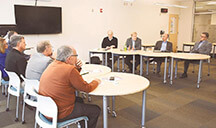What’s Alexandria’s ‘secret sauce’ for closing skills gap
The following article was published in the Echo Press© newspaper (Oct. 21,2015)
By Al Edenloff, Editor
People working together for the common good — not laws — can play the biggest role in closing the gap of getting skilled workers to fill high-tech manufacturing jobs.
That was one of the lessons the Center of the American Experiment learned from a public meeting in Alexandria [Minn.] last Wednesday.
The center, a Minneapolis-based think tank, selected Alexandria to lead off a dozen informal town meetings because of its track record of success.
Alexandria is a thriving regional manufacturing hub, creating 18 percent of local jobs, noted Ron Eibensteiner, a Minneapolis-based venture capitalist and American Experiment board member who co-chaired the meeting with Senator Bill Ingebrigtsen, R-Alexandria.
Alexandria is also home to five of the world's leading manufacturers of automated packaging machines, marking the region as one of the leaders in technology development and innovation in this industry, Eibensteiner said.
"Instead of focusing first on problems related to the skills gap, we wanted to focus on a community that has found some solutions," Eibensteiner said. "From what we can tell, no community has done that better than Alexandria."
Leaders of the center wanted to know Alexandria's "secret sauce" for its ability to pass a referendum to build a new school, how to forge partnerships between education and manufacturers, and how community leadership can be more important than legislation to solve the state's looming skills gap.
The group met in a conference room at the Alexandria Area High School (AAHS) and included local leaders in education, manufacturing and economic development: Julie Critz, Alexandria's school superintendent; Tom Ellison, instructor at AAHS; Brent Smith, founder of the Aagard Group; Tom Schabel, chief executive officer of Alexandria Industries, and Duane Taillefer, vice president of operations with Massman Automation Designs.
The center learned about the high school's new manufacturing lab. It was outfitted with sophisticated high tech equipment, much of it donated by local manufacturers whose employees also provide hands-on instruction.
Critz said a key factor in the vote for the new school was raising nearly $7 million from the private sector before going to the public with a bond request to build the school.
She added that the partnerships with manufacturers helped create a "community culture" that drew in leaders from the hospital, banking industry, business and other influencers.
Local manufacturing leaders said they are still struggling to find skilled applicants to fill the positions.
Alexandria Industries has 20 openings. Schabel said the company needs to continue to partner with AAHS to build the pool of available, highly trained workers.
Schabel said it's crucial to build interest in high-tech manufacturing jobs at a younger age.
Smith said the problem was that not enough people seem to be interested in the type of jobs that are available. He said there's still a stigma attached to pursuing two-year degrees in the high-tech manufacturing field. Instead, graduates opt for four-year colleges, but many of them drop out, take a break, or change plans before earning a degree.
Critz said that many students and their parents are still stereotyping manufacturing careers as dirty, dingy and low-paying, which is not the case.
 |
|---|
A panel representing Alexandria's education and manufacturing leaders walk with members of the Center of the American Experiment at the Alexandria Area High School on October 14. |
Schabel said that local manufacturers are trying to address that problem by inviting school counselors, educators, students and parents into their facilities so they can see how much things have changed from the "shop class" days decades ago.
Another key ingredient in Alexandria's secret sauce, manufacturers said, is faith. They said that groups like the Unity Foundation and Love Inc. have helped break down the silos between competing manufacturers by having them work together toward a common cause.
Smith noted that Love Inc. organized a round table that drew 150 business leaders to work together on doing the right things for their employees and the community.
Schabel agreed, saying that working together for the greater good separates Alexandria from other cities. "Living in this community makes what we do a heck of a lot easier," he said.
Smith, Schabel and Taillefer said that government often conflicts with their business by imposing higher income taxes and excessive regulations.
After the meeting, American Center leaders said they were impressed — and surprised — with what they heard.
"Meetings like this tend too often to look first for legislative solutions," Eibensteiner said. "The Alexandria model demonstrates that sometimes, maybe most times, the best public policies don't include government at all."
The Skills Gap
There are more than 6,500 open manufacturing jobs in Minnesota today, according to the Center of the American Experiment. Most of those jobs are unfilled because companies can't find applicants with the skills necessary to work in the increasingly high-tech demands within manufacturing companies.
The National Association of Manufacturers recently projected that almost 60 percent of 3.5 million manufacturing jobs over the next decade will go unfilled as experienced baby boomers retire, and fewer young people acquire needed skills.
On top of this, Minnesota will be first among states by 2018 in the percentage of jobs requiring some post-secondary education.
